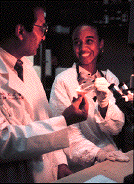Shyamal K. Majumdar
 Kreider Professor Emeritus of Biology
Kreider Professor Emeritus of Biology
Cell Biology and Genetics
(majumdas@lafayette.edu) e-mail
(610) 330-5464 voice
(610) 330-5705 FAX
My scientific inquiries focus on two areas. The first area involves the mutagenicity and toxicity testing of various antitumor drugs, both in mice and on cells growing in culture. Human and mouse cells are cultured in vitro and the effects of various chemicals on their growth rates and genotoxicity are assessed.
The second area of studies includes cell biology. Biochemical studies such as protein kinases and caspases activities, nucleosomal assay, ELISA, immunofluorescence techniques, etc., are utilized to determine the cell death mechanism (apoptosis or necrosis) induced by chemotherapeutic and chemopreventive drugs on cancer and non-cancer mouse and human cells. Immunofluorescence techniques are employed to study microtubule organization and disturbances in cancerous and non-cancerous cells exposed to anticancer drugs.
Representative Studies:
- Apoptosis detection of Imatinib Mesylate (Gleevec) utilizing fluorescence and scanning electron microscopy in mouse erythroleukemia cells (GM-86) and human cervical carcinoma cells (HeLa), with I-Lee Hwa (’06).
- Differential antiproliferative effects of several anti-cancer drugs on different forms of human and mouse cancer cells, with Christopher Sweitzer (’07), Benjamin Kaplan (’07), and Aviva Goel (’08).
- Comparative cytotoxicity determination of Tamoxifen and Raloxifene in 4T1 mouse breast cancer cells using Trypan blue vital dye and by detection of mitochondrial dehydrogenases activity and mitochondrial membrane potential disruption, with Michael McCormack (’07).
- Anti-tumorigenic assessment of Raloxifene and Tamoxifen alone and in combination on breast cancer cells in mice.
Representative Publications:
- Kirk, M.J. (’05), Fotiadis, N.A. (’05), and Majumdar, S.K. (2006). An in vitro study of the cytogenetic and cytotoxic effects of Imatinib Mesylate ST1571 on murine erythroleukemia cells. Journal of Chemotherapy. 18: 49-55.
- Majumdar, S.K., Hwa, I. W. (’06), Sweitzer, C.J. (’07), Kirk, M.J. (’05), and Fotiadis, N.A. (’05). (2006). Genotoxicity of imatinib mesylate, an effective anti-cancer drug, in murine erythroleukemia (GM-86) and human cervical carcinoma (HeLa) cells. Proceedings of the Pan-African Environmental Mutagen Conference (in press).
- Xanthopoulos, J.M. (’04), Romano, A.E. (’04), and Majumdar, S.K. (2005). Response of mouse breast cancer cells to anastrazole, tamoxifen, and the combination. Journal of Biomedicine and Biotechnology. 2005: 10-19.
- Romano, A.E. (’04) and Majumdar, S.K. (2004). In vitro apoptotic death induction in mouse breast cancer cells treated with anastrozole and tamoxifen. Journal of the Pennsylvania Academy of Science. 77: 147.
- Majumdar, S.K. and Satuh, S.A. (’03). (2003). Apoptotic mediated selenium toxicity induction in mammalian cancer cells. Supplement to Molecular Biology of the Cell. 14: 421a.
- Ruddy, J.B. (’01) and S. K. Majumdar (2002). Antitumorigenic evaluation of thalidomide alone and in combination with cisplatin in DBA2/J mice. Journal of Biomedicine and Biotechnology 2: 7-13.
- Perreca, S. M. (’01), K. Ouchi (’01), E. M. Slotkin (’01), and S. K. Majumdar (2001). Effects of thalidomide alone and in combination with human liver S9 fraction on cell multiplication and surface ultrastructure of cultured human and murine cells. The Nucleus 44 (1, 2): 22-27.
- Majumdar, S. K., J. A. Valdellon (’99), and K. A. Brown (’99) (2001). In vitro investigations on the toxicity and cell death induced by tamoxifen on two non-breast cancer cell types. Journal of Biomedicine and Biotechnology 1(3): 99-107.
- Ruddy, J. M.(’01), C. Marc (’00), and S. K. Majumdar (2000). In vitro cytotoxic evaluation of fumagillin, a potent anti-angiogenic chemical, on mouse and human cancer cell lines. Advances in Pharmacology and Toxicology 1(2): 1-11.